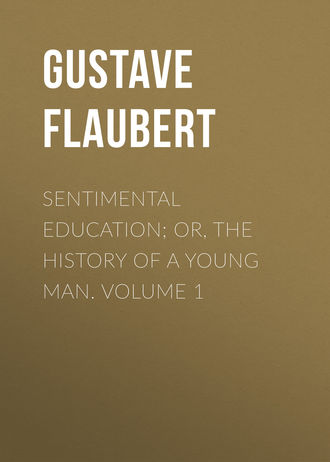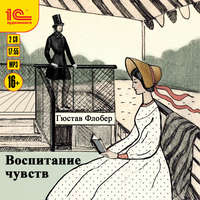 полная версия
полная версияSentimental Education; Or, The History of a Young Man. Volume 1
Frederick was wounded in his predilections, and he felt a desire to cut the discussion short. Why not take the risk at once of uttering the word on which his happiness depended? He asked this literary youth whether it would be possible to get an introduction into the Arnoux's house through his agency.
The thing was declared to be quite easy, and they fixed upon the following day.
Hussonnet failed to keep the appointment, and on three subsequent occasions he did not turn up. One Saturday, about four o'clock, he made his appearance. But, taking advantage of the cab into which they had got, he drew up in front of the Théàtre Français to get a box-ticket, got down at a tailor's shop, then at a dressmaker's, and wrote notes in the door-keeper's lodge. At last they came to the Boulevard Montmartre. Frederick passed through the shop, and went up the staircase. Arnoux recognised him through the glass-partition in front of his desk, and while continuing to write he stretched out his hand and laid it on Frederick's shoulder.
Five or six persons, standing up, filled the narrow apartment, which was lighted by a single window looking out on the yard, a sofa of brown damask wool occupying the interior of an alcove between two door-curtains of similar material. Upon the chimney-piece, covered with old papers, there was a bronze Venus. Two candelabra, garnished with rose-coloured wax-tapers, supported it, one at each side. At the right near a cardboard chest of drawers, a man, seated in an armchair, was reading the newspaper, with his hat on. The walls were hidden from view beneath the array of prints and pictures, precious engravings or sketches by contemporary masters, adorned with dedications testifying the most sincere affection for Jacques Arnoux.
"You're getting on well all this time?" said he, turning round to Frederick.
And, without waiting for an answer, he asked Hussonnet in a low tone:
"What is your friend's name?" Then, raising his voice:
"Take a cigar out of the box on the cardboard stand."
The office of L'Art Industriel, situated in a central position in Paris, was a convenient place of resort, a neutral ground wherein rivalries elbowed each other familiarly. On this day might be seen there Anténor Braive, who painted portraits of kings; Jules Burrieu, who by his sketches was beginning to popularise the wars in Algeria; the caricaturist Sombary, the sculptor Vourdat, and others. And not a single one of them corresponded with the student's preconceived ideas. Their manners were simple, their talk free and easy. The mystic Lovarias told an obscene story; and the inventor of Oriental landscape, the famous Dittmer, wore a knitted shirt under his waistcoat, and went home in the omnibus.
The first topic that came on the carpet was the case of a girl named Apollonie, formerly a model, whom Burrieu alleged that he had seen on the boulevard in a carriage. Hussonnet explained this metamorphosis through the succession of persons who had loved her.
"How well this sly dog knows the girls of Paris!" said Arnoux.
"After you, if there are any of them left, sire," replied the Bohemian, with a military salute, in imitation of the grenadier offering his flask to Napoléon.
Then they talked about some pictures in which Apollonie had sat for the female figures. They criticised their absent brethren, expressing astonishment at the sums paid for their works; and they were all complaining of not having been sufficiently remunerated themselves, when the conversation was interrupted by the entrance of a man of middle stature, who had his coat fastened by a single button, and whose eyes glittered with a rather wild expression.
"What a lot of shopkeepers you are!" said he. "God bless my soul! what does that signify? The old masters did not trouble their heads about the million – Correggio, Murillo – "
"Add Pellerin," said Sombary.
But, without taking the slightest notice of the epigram, he went on talking with such vehemence, that Arnoux was forced to repeat twice to him:
"My wife wants you on Thursday. Don't forget!"
This remark recalled Madame Arnoux to Frederick's thoughts. No doubt, one might be able to reach her through the little room near the sofa. Arnoux had just opened the portière leading into it to get a pocket-handkerchief, and Frédéric had seen a wash-stand at the far end of the apartment.
But at this point a kind of muttering sound came from the corner of the chimney-piece; it was caused by the personage who sat in the armchair reading the newspaper. He was a man of five feet nine inches in height, with rather heavy eyelashes, a head of grey hair, and an imposing appearance; and his name was Regimbart.
"What's the matter now, citizen?" said Arnoux.
"Another fresh piece of rascality on the part of Government!"
The thing that he was referring to was the dismissal of a schoolmaster.
Pellerin again took up his parallel between Michael Angelo and Shakespeare. Dittmer was taking himself off when Arnoux pulled him back in order to put two bank notes into his hand. Thereupon Hussonnet said, considering this an opportune time:
"Couldn't you give me an advance, my dear master – ?"
But Arnoux had resumed his seat, and was administering a severe reprimand to an old man of mean aspect, who wore a pair of blue spectacles.
"Ha! a nice fellow you are, Père Isaac! Here are three works cried down, destroyed! Everybody is laughing at me! People know what they are now! What do you want me to do with them? I'll have to send them off to California – or to the devil! Hold your tongue!"
The specialty of this old worthy consisted in attaching the signatures of the great masters at the bottom of these pictures. Arnoux refused to pay him, and dismissed him in a brutal fashion. Then, with an entire change of manner, he bowed to a gentleman of affectedly grave demeanour, who wore whiskers and displayed a white tie round his neck and the cross of the Legion of Honour over his breast.
With his elbow resting on the window-fastening, he kept talking to him for a long time in honeyed tones. At last he burst out:
"Ah! well, I am not bothered with brokers, Count."
The nobleman gave way, and Arnoux paid him down twenty-five louis. As soon as he had gone out:
"What a plague these big lords are!"
"A lot of wretches!" muttered Regimbart.
As it grew later, Arnoux was much more busily occupied. He classified articles, tore open letters, set out accounts in a row; at the sound of hammering in the warehouse he went out to look after the packing; then he went back to his ordinary work; and, while he kept his steel pen running over the paper, he indulged in sharp witticisms. He had an invitation to dine with his lawyer that evening, and was starting next day for Belgium.
The others chatted about the topics of the day – Cherubini's portrait, the hemicycle of the Fine Arts, and the next Exhibition. Pellerin railed at the Institute. Scandalous stories and serious discussions got mixed up together. The apartment with its low ceiling was so much stuffed up that one could scarcely move; and the light of the rose-coloured wax-tapers was obscured in the smoke of their cigars, like the sun's rays in a fog.
The door near the sofa flew open, and a tall, thin woman entered with abrupt movements, which made all the trinkets of her watch rattle under her black taffeta gown.
It was the woman of whom Frederick had caught a glimpse last summer at the Palais-Royal. Some of those present, addressing her by name, shook hands with her. Hussonnet had at last managed to extract from his employer the sum of fifty francs. The clock struck seven.
All rose to go.
Arnoux told Pellerin to remain, and accompanied Mademoiselle Vatnaz into the dressing-room.
Frederick could not hear what they said; they spoke in whispers. However, the woman's voice was raised:
"I have been waiting ever since the job was done, six months ago."
There was a long silence, and then Mademoiselle Vatnaz reappeared. Arnoux had again promised her something.
"Oh! oh! later, we shall see!"
"Good-bye! happy man," said she, as she was going out.
Arnoux quickly re-entered the dressing-room, rubbed some cosmetic over his moustaches, raised his braces, stretched his straps; and, while he was washing his hands:
"I would require two over the door at two hundred and fifty apiece, in Boucher's style. Is that understood?"
"Be it so," said the artist, his face reddening.
"Good! and don't forget my wife!"
Frederick accompanied Pellerin to the top of the Faubourg Poissonnière, and asked his permission to come to see him sometimes, a favour which was graciously accorded.
Pellerin read every work on æsthetics, in order to find out the true theory of the Beautiful, convinced that, when he had discovered it, he would produce masterpieces. He surrounded himself with every imaginable auxiliary – drawings, plaster-casts, models, engravings; and he kept searching about, eating his heart out. He blamed the weather, his nerves, his studio, went out into the street to find inspiration there, quivered with delight at the thought that he had caught it, then abandoned the work in which he was engaged, and dreamed of another which should be finer. Thus, tormented by the desire for glory, and wasting his days in discussions, believing in a thousand fooleries – in systems, in criticisms, in the importance of a regulation or a reform in the domain of Art – he had at fifty as yet turned out nothing save mere sketches. His robust pride prevented him from experiencing any discouragement, but he was always irritated, and in that state of exaltation, at the same time factitious and natural, which is characteristic of comedians.
On entering his studio one's attention was directed towards two large pictures, in which the first tones of colour laid on here and there made on the white canvas spots of brown, red, and blue. A network of lines in chalk stretched overhead, like stitches of thread repeated twenty times; it was impossible to understand what it meant. Pellerin explained the subject of these two compositions by pointing out with his thumb the portions that were lacking. The first was intended to represent "The Madness of Nebuchadnezzar," and the second "The Burning of Rome by Nero." Frederick admired them.
He admired academies of women with dishevelled hair, landscapes in which trunks of trees, twisted by the storm, abounded, and above all freaks of the pen, imitations from memory of Callot, Rembrandt, or Goya, of which he did not know the models. Pellerin no longer set any value on these works of his youth. He was now all in favour of the grand style; he dogmatised eloquently about Phidias and Winckelmann. The objects around him strengthened the force of his language; one saw a death's head on a prie-dieu, yataghans, a monk's habit. Frederick put it on.
When he arrived early, he surprised the artist in his wretched folding-bed, which was hidden from view by a strip of tapestry; for Pellerin went to bed late, being an assiduous frequenter of the theatres. An old woman in tatters attended on him. He dined at a cook-shop, and lived without a mistress. His acquirements, picked up in the most irregular fashion, rendered his paradoxes amusing. His hatred of the vulgar and the "bourgeois" overflowed in sarcasms, marked by a superb lyricism, and he had such religious reverence for the masters that it raised him almost to their level.
But why had he never spoken about Madame Arnoux? As for her son, at one time he called Pellerin a decent fellow, at other times a charlatan. Frederick was waiting for some disclosures on his part.
One day, while turning over one of the portfolios in the studio, he thought he could trace in the portrait of a female Bohemian some resemblance to Mademoiselle Vatnaz; and, as he felt interested in this lady, he desired to know what was her exact social position.
She had been, as far as Pellerin could ascertain, originally a schoolmistress in the provinces. She now gave lessons in Paris, and tried to write for the small journals.
According to Frederick, one would imagine from her manners with Arnoux that she was his mistress.
"Pshaw! he has others!"
Then, turning away his face, which reddened with shame as he realised the baseness of the suggestion, the young man added, with a swaggering air:
"Very likely his wife pays him back for it?"
"Not at all; she is virtuous."
Frederick again experienced a feeling of compunction, and the result was that his attendance at the office of the art journal became more marked than before.
The big letters which formed the name of Arnoux on the marble plate above the shop seemed to him quite peculiar and pregnant with significance, like some sacred writing. The wide footpath, by its descent, facilitated his approach; the door almost turned of its own accord; and the handle, smooth to the touch, gave him the sensation of friendly and, as it were, intelligent fingers clasping his. Unconsciously, he became quite as punctual as Regimbart.
Every day Regimbart seated himself in the chimney corner, in his armchair, got hold of the National, and kept possession of it, expressing his thoughts by exclamations or by shrugs of the shoulders. From time to time he would wipe his forehead with his pocket-handkerchief, rolled up in a ball, which he usually stuck in between two buttons of his green frock-coat. He had trousers with wrinkles, bluchers, and a long cravat; and his hat, with its turned-up brim, made him easily recognised, at a distance, in a crowd.
At eight o'clock in the morning he descended the heights of Montmartre, in order to imbibe white wine in the Rue Nôtre Dame des Victoires. A late breakfast, following several games of billiards, brought him on to three o'clock. He then directed his steps towards the Passage des Panoramas, where he had a glass of absinthe. After the sitting in Arnoux's shop, he entered the Bordelais smoking-divan, where he swallowed some bitters; then, in place of returning home to his wife, he preferred to dine alone in a little café in the Rue Gaillon, where he desired them to serve up to him "household dishes, natural things." Finally, he made his way to another billiard-room, and remained there till midnight, in fact, till one o'clock in the morning, up till the last moment, when, the gas being put out and the window-shutters fastened, the master of the establishment, worn out, begged of him to go.
And it was not the love of drinking that attracted Citizen Regimbart to these places, but the inveterate habit of talking politics at such resorts. With advancing age, he had lost his vivacity, and now exhibited only a silent moroseness. One would have said, judging from the gravity of his countenence, that he was turning over in his mind the affairs of the whole world. Nothing, however, came from it; and nobody, even amongst his own friends, knew him to have any occupation, although he gave himself out as being up to his eyes in business.
Arnoux appeared to have a very great esteem for him. One day he said to Frederick:
"He knows a lot, I assure you. He is an able man."
On another occasion Regimbart spread over his desk papers relating to the kaolin mines in Brittany. Arnoux referred to his own experience on the subject.
Frederick showed himself more ceremonious towards Regimbart, going so far as to invite him from time to time to take a glass of absinthe; and, although he considered him a stupid man, he often remained a full hour in his company solely because he was Jacques Arnoux's friend.
After pushing forward some contemporary masters in the early portions of their career, the picture-dealer, a man of progressive ideas, had tried, while clinging to his artistic ways, to extend his pecuniary profits. His object was to emancipate the fine arts, to get the sublime at a cheap rate. Over every industry associated with Parisian luxury he exercised an influence which proved fortunate with respect to little things, but fatal with respect to great things. With his mania for pandering to public opinion, he made clever artists swerve from their true path, corrupted the strong, exhausted the weak, and got distinction for those of mediocre talent; he set them up with the assistance of his connections and of his magazine. Tyros in painting were ambitious of seeing their works in his shop-window, and upholsterers brought specimens of furniture to his house. Frederick regarded him, at the same time, as a millionaire, as a dilettante, and as a man of action. However, he found many things that filled him with astonishment, for my lord Arnoux was rather sly in his commercial transactions.
He received from the very heart of Germany or of Italy a picture purchased in Paris for fifteen hundred francs, and, exhibiting an invoice that brought the price up to four thousand, sold it over again through complaisance for three thousand five hundred. One of his usual tricks with painters was to exact as a drink-allowance an abatement in the purchase-money of their pictures, under the pretence that he would bring out an engraving of it. He always, when selling such pictures, made a profit by the abatement; but the engraving never appeared. To those who complained that he had taken an advantage of them, he would reply by a slap on the stomach. Generous in other ways, he squandered money on cigars for his acquaintances, "thee'd" and "thou'd" persons who were unknown, displayed enthusiasm about a work or a man; and, after that, sticking to his opinion, and, regardless of consequences, spared no expense in journeys, correspondence, and advertising. He looked upon himself as very upright, and, yielding to an irresistible impulse to unbosom himself, ingenuously told his friends about certain indelicate acts of which he had been guilty. Once, in order to annoy a member of his own trade who inaugurated another art journal with a big banquet, he asked Frederick to write, under his own eyes, a little before the hour fixed for the entertainment, letters to the guests recalling the invitations.
"This impugns nobody's honour, do you understand?"
And the young man did not dare to refuse the service.
Next day, on entering with Hussonnet M. Arnoux's office, Frederick saw through the door (the one opening on the staircase) the hem of a lady's dress disappearing.
"A thousand pardons!" said Hussonnet. "If I had known that there were women – "
"Oh! as for that one, she is my own," replied Arnoux. "She just came in to pay me a visit as she was passing."
"You don't say so!" said Frederick.
"Why, yes; she is going back home again."
The charm of the things around him was suddenly withdrawn. That which had seemed to him to be diffused vaguely through the place had now vanished – or, rather, it had never been there. He experienced an infinite amazement, and, as it were, the painful sensation of having been betrayed.
Arnoux, while rummaging about in his drawer, began to smile. Was he laughing at him? The clerk laid down a bundle of moist papers on the table.
"Ha! the placards," exclaimed the picture-dealer. "I am not ready to dine this evening."
Regimbart took up his hat.
"What, are you leaving me?"
"Seven o'clock," said Regimbart.
Frederick followed him.
At the corner of the Rue Montmartre, he turned round. He glanced towards the windows of the first floor, and he laughed internally with self-pity as he recalled to mind with what love he had so often contemplated them. Where, then, did she reside? How was he to meet her now? Once more around the object of his desire a solitude opened more immense than ever!
"Are you coming to take it?" asked Regimbart.
"To take what?"
"The absinthe."
And, yielding to his importunities, Frederick allowed himself to be led towards the Bordelais smoking-divan. Whilst his companion, leaning on his elbow, was staring at the decanter, he was turning his eyes to the right and to the left. But he caught a glimpse of Pellerin's profile on the footpath outside; the painter gave a quick tap at the window-pane, and he had scarcely sat down when Regimbart asked him why they no longer saw him at the office of L'Art Industriel.
"May I perish before ever I go back there again. The fellow is a brute, a mere tradesman, a wretch, a downright rogue!"
These insulting words harmonised with Frederick's present angry mood. Nevertheless, he was wounded, for it seemed to him that they hit at Madame Arnoux more or less.
"Why, what has he done to you?" said Regimbart.
Pellerin stamped with his foot on the ground, and his only response was an energetic puff.
He had been devoting himself to artistic work of a kind that he did not care to connect his name with, such as portraits for two crayons, or pasticcios from the great masters for amateurs of limited knowledge; and, as he felt humiliated by these inferior productions, he preferred to hold his tongue on the subject as a general rule. But "Arnoux's dirty conduct" exasperated him too much. He had to relieve his feelings.
In accordance with an order, which had been given in Frederick's very presence, he had brought Arnoux two pictures. Thereupon the dealer took the liberty of criticising them. He found fault with the composition, the colouring, and the drawing – above all the drawing; he would not, in short, take them at any price. But, driven to extremities by a bill falling due, Pellerin had to give them to the Jew Isaac; and, a fortnight later, Arnoux himself sold them to a Spaniard for two thousand francs.
"Not a sou less! What rascality! and, faith, he has done many other things just as bad. One of these mornings we'll see him in the dock!"
"How you exaggerate!" said Frederick, in a timid voice.
"Come, now, that's good; I exaggerate!" exclaimed the artist, giving the table a great blow with his fist.
This violence had the effect of completely restoring the young man's self-command. No doubt he might have acted more nicely; still, if Arnoux found these two pictures —
"Bad! say it out! Are you a judge of them? Is this your profession? Now, you know, my youngster, I don't allow this sort of thing on the part of mere amateurs."
"Ah! well, it's not my business," said Frederick.
"Then, what interest have you in defending him?" returned Pellerin, coldly.
The young man faltered:
"But – since I am his friend – "
"Go, and give him a hug for me. Good evening!"
And the painter rushed away in a rage, and, of course, without paying for his drink.
Frederick, whilst defending Arnoux, had convinced himself. In the heat of his eloquence, he was filled with tenderness towards this man, so intelligent and kind, whom his friends calumniated, and who had now to work all alone, abandoned by them. He could not resist a strange impulse to go at once and see him again. Ten minutes afterwards he pushed open the door of the picture-warehouse.
Arnoux was preparing, with the assistance of his clerks, some huge placards for an exhibition of pictures.
"Halloa! what brings you back again?"
This question, simple though it was, embarrassed Frederick, and, at a loss for an answer, he asked whether they had happened to find a notebook of his – a little notebook with a blue leather cover.
"The one that you put your letters to women in?" said Arnoux.
Frederick, blushing like a young girl, protested against such an assumption.
"Your verses, then?" returned the picture-dealer.
He handled the pictorial specimens that were to be exhibited, discovering their form, colouring, and frames; and Frederick felt more and more irritated by his air of abstraction, and particularly by the appearance of his hands – large hands, rather soft, with flat nails. At length, M. Arnoux arose, and saying, "That's disposed of!" he chucked the young man familiarly under the chin. Frederick was offended at this liberty, and recoiled a pace or two; then he made a dash for the shop-door, and passed out through it, as he imagined, for the last time in his life. Madame Arnoux herself had been lowered by the vulgarity of her husband.
During the same week he got a letter from Deslauriers, informing him that the clerk would be in Paris on the following Thursday. Then he flung himself back violently on this affection as one of a more solid and lofty character. A man of this sort was worth all the women in the world. He would no longer have any need of Regimbart, of Pellerin, of Hussonnet, of anyone! In order to provide his friend with as comfortable lodgings as possible, he bought an iron bedstead and a second armchair, and stripped off some of his own bed-covering to garnish this one properly. On Thursday morning he was dressing himself to go to meet Deslauriers when there was a ring at the door.








